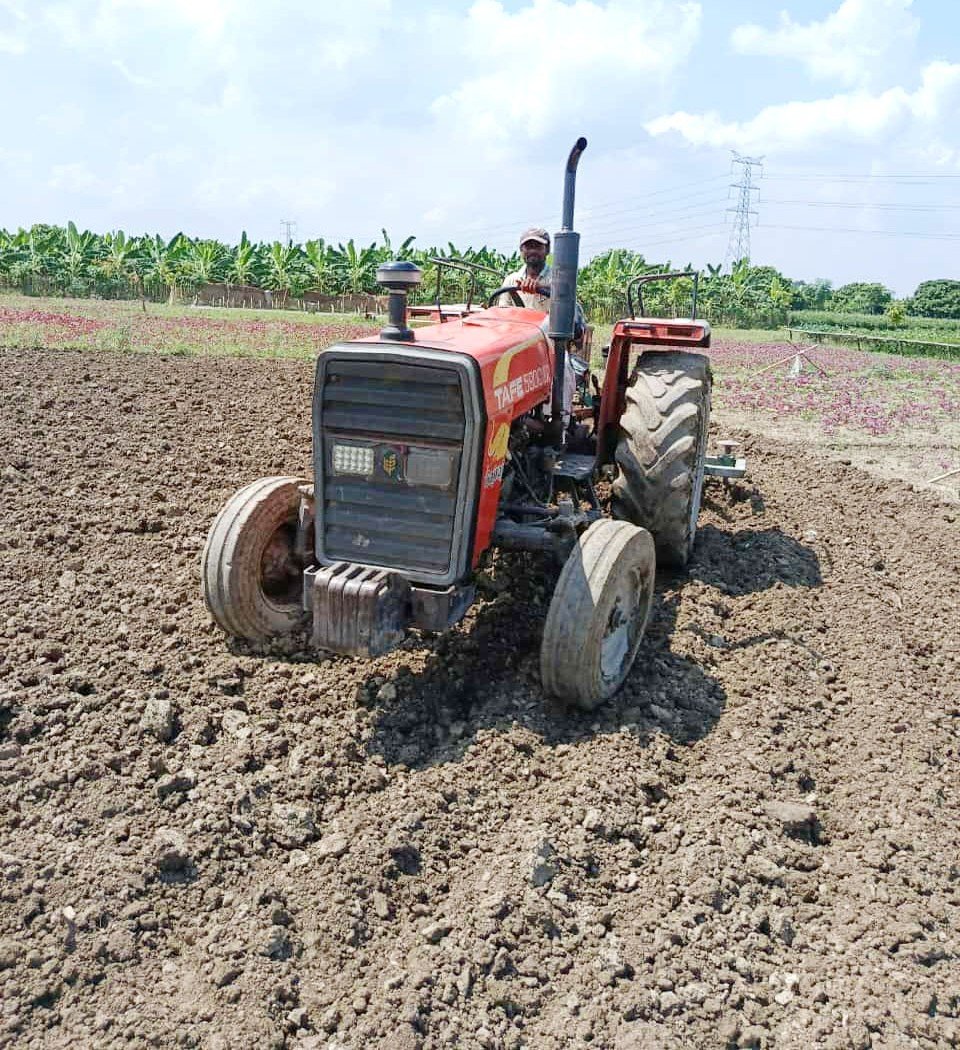Ishwardi farmers busy growing winter vegetables
Heavy rain damages vegetables such as carrot, radish


Farmers have started preparing land for cultivation of winter vegetables at Ishwardi in Pabna despite recent crop damage caused by heavy rain.
From early morning until dusk, local farmers can be seen preparing their fields using spades, power tillers, and tractors.
While most farmers are now focusing on the upcoming winter crops, those who had planted early varieties of radish, carrot, bitter gourd, and cauliflower suffered significant losses due to continuous downpours over the past few days. Guava and dragon fruit growers have also reported damages.
The Rabi season typically begins in early October, and Ishwardi is known for its large-scale production of vegetables. The area sees substantial cultivation of beans, okra, radish, carrot, brinjal (aubergine), cauliflower, cabbage, tomato, coriander, bottle gourd, pumpkin, red spinach, and other greens. In addition to vegetables, Ishwardi is famous for producing some of the country’s best litchis, guavas, plums, and jackfruits.
According to the local agriculture office, the target for winter vegetable cultivation this year is set at 7,600 hectares. The unions of Salimpur, Muladuli, Lakshmikunda, and Sahapur are the most active in vegetable farming.
A visit to the fields reveals busy scenes of preparation. Some farmers are removing weeds, while others are tilling the soil. Once the land is properly prepared, they will begin planting seeds and seedlings for various winter crops.
Farmer Selim Hossain from Burampur village in Lakshmikunda Union said he sowed carrots on eight bighas of land in mid-September. To increase yield, he planted the seeds on raised beds. But due to several days of heavy rain, the beds collapsed, and many carrot plants were flattened. He expects his production to drop by at least half, fearing that he won’t recover his investment.
Suman Ali, a farmer from Char Gargari area in Sahapur Union, cultivates guava, dragon fruit, bananas, and vegetables. He reported damage to eight bighas of guava and three bighas of banana and dragon fruit crops. "Just as the flowers were blooming, the rains started and destroyed everything," he said. "I’ve lost several lakhs of taka." Undeterred, he has already started planting winter vegetables such as local beans, bottle gourd, and cucumber to recover from the loss.
To make up for the damage, farmers across the upazila are now actively sowing winter vegetables like okra, brinjal, bottle gourd, beans, cauliflower, cabbage, red and green leafy vegetables, coriander, and radish.
Mahfuzul Alam, a farmer from Muladuli Union, noted that the area is especially known for its early and traditional varieties of beans and okra. “We’ve already started planting local ridge gourd, beans, and sponge gourd on three bighas of land,” he said. “Vegetables sold at the beginning of the season fetch higher prices.”
According to Agricultural Sub-Assistant Sujon Islam, “The farmers here are hardworking and skilled. Even when nature causes losses, they do not give up. They quickly switch to other crops and continue farming. Ishwardi’s fertile soil supports a wide variety of crops year-round.”
Ishwardi Upazila Agriculture Officer, Abdul Momin, said that while the official winter season starts in October, farmers in Ishwardi grow vegetables and fruits almost all year round. “This upazila is one of the top producers of winter vegetables in the country. Farmers never leave their land idle. If the weather stays favourable, we expect record production this season,” he said. “Though some damage has occurred due to excessive rainfall, we’ve supported the affected farmers and will continue to stand by them.”


